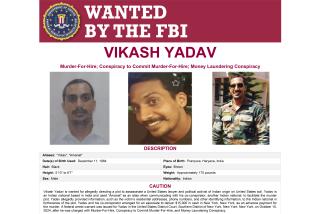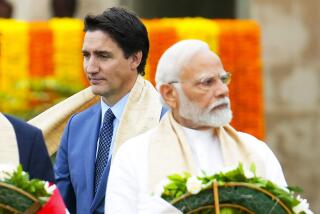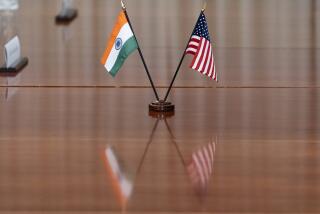Pakistan acknowledges Mumbai plot was hatched on its soil
- Share via
ISLAMABAD, PAKISTAN, AND ISTANBUL, TURKEY — Two and a half months after the Mumbai terrorist attacks, Pakistan for the first time publicly acknowledged Thursday that the assailants used Pakistani soil to plot and launch the deadly rampage in India.
The senior official in Pakistan’s Interior Ministry, Rehman Malik, also told reporters in Islamabad, the Pakistani capital, that half a dozen of the accused Mumbai conspirators are in custody, including the suspected ringleaders, and that criminal proceedings have been launched against them.
Malik’s announcement echoed assertions made by Indian investigators as the siege unfolded over three days in late November: that the attackers set out for India’s commercial and entertainment hub from the Pakistani port of Karachi, and had been trained and armed in Pakistan. More than 160 people were killed in the attacks.
Because of the two nations’ long-standing enmity, and a surge of indignation in Islamabad over New Delhi’s accusations that Pakistan’s intelligence establishment was complicit, Pakistani authorities have been extremely reluctant to acknowledge that the plot’s origins lay in their country. So sensitive is the issue, and so prickly the nationalistic sentiment aroused in the nation, that Pakistan’s national security advisor was fired last month for telling journalists that the sole surviving suspected attacker was a Pakistani -- a point that the Pakistani government ultimately was forced to concede.
Pakistan has been under heavy international pressure, particularly from the United States, to find and punish the perpetrators. Malik’s statements came on the final day of a four-day visit by Richard C. Holbrooke, the Obama administration’s special envoy to the region.
The Mumbai attacks sparked fear that the nuclear-armed neighbors, which have fought three conventional wars, might go to battle again. That fear has since died down, but tension persists over what India has described as foot-dragging on Pakistan’s part in carrying out its investigation.
The meting out of convictions and prison sentences is rare in Pakistan even in major terrorist attacks. Delays and legal obfuscation prevent many cases from going to trial.
Although Malik’s disclosures suggested Pakistani willingness to follow through with prosecutions, he also made a point of saying that India needed to provide more evidence to secure convictions. He also said there was no conclusive proof yet that the nine gunmen killed during the attacks on luxury hotels, a train station and a Jewish center were of Pakistani origin.
India -- backed by U.S. intelligence -- has pointed the finger at Lashkar-e-Taiba, a Pakistan-based militant group that has long fought Indian forces in the disputed Himalayan region of Kashmir, as the main perpetrator of the Mumbai attacks.
Pakistan has shut down offices of an arm of the group, its self-described charitable wing, Jamaat ud-Dawa, but has moved less dramatically and overtly against Lashkar itself, which is already outlawed.
Indian officials warily welcomed Malik’s statements, the fullest accounting to date of what Pakistani investigators have uncovered. The Indian Ministry of External Affairs said it would follow developments in Pakistan closely to ensure that the perpetrators are brought to justice.
Malik said investigators had traced a boat engine used by the assailants in their voyage from Karachi. He also said authorities had raided two hide-outs near the port city.
But he stopped short of saying the plot had originated in its entirety in Pakistan. “Some part of the conspiracy has taken place in Pakistan,” he said, but added that leads pointed elsewhere as well.
One of the suspects, Javed Iqbal, was arrested after being lured back to Pakistan from Barcelona, Spain, Malik said.
Preliminary criminal cases have been lodged against eight suspects, including two still at large, who are accused of “abetting, conspiracy and facilitation” of a terrorist act, Malik said. Those in custody include two alleged Lashkar leaders, Zaki-ur Rehman Lakhvi and Zarar Shah, he said, confirming reports of their arrests.
Malik was careful to characterize the conspirators as “non-state actors” -- in line with Pakistan’s insistence that no government agency was involved in the plot. India has said it suspects the complicity of elements in Pakistan’s Inter-Services Intelligence agency, which allegedly have helped create and nurture Lashkar.
Pakistan has repeatedly denied Indian requests to extradite the suspects, saying it will try them in its own courts. But Malik sought to dispel any notion that would mean greater leniency for the accused.
“I want to assure our nation, I want to assure the international community, that we mean business,” he said.
--
--
Zaidi is a special correspondent. Pavitra Ramaswamy of The Times’ New Delhi Bureau contributed to this report.
More to Read
Sign up for Essential California
The most important California stories and recommendations in your inbox every morning.
You may occasionally receive promotional content from the Los Angeles Times.










